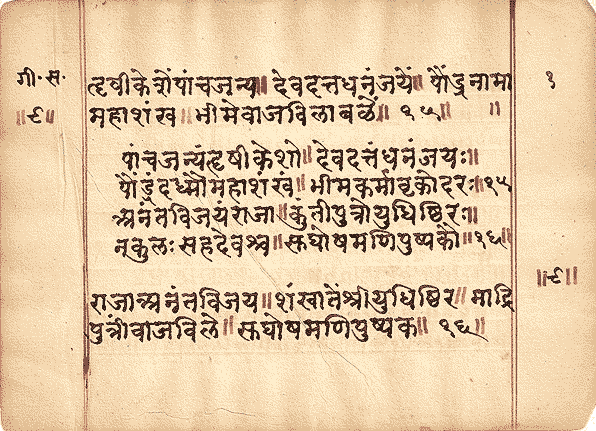
pāñcajanyaṃ hṛṣīkeśo devadattaṃ dhanaṃjayaḥ
pauṇḍraṃ dadhmau mahā-śaṅkhaṃ bhīma-karmā vṛkodaraḥ
anantavijayaṃ rājā kuntī-putro yudhiṣṭhiraḥ
nakulaḥ sahadevaś ca sughoṣa-maṇipuṣpakau
Update RequiredTo play the media you will need to either update your browser to a recent version or update your Flash plugin.
hṛṣīkeśaḥ (Hṛṣīkeśa) pāñca-janyam (Pāñcajanya) [dadhmau] (he blew),
dhanaṁ-jayaḥ (Dhanaṁjaya) deva-dattaṁ (Devadatta) [dadhmau] (he blew),
bhīma-karmā (one whose acts are frightful) vṛkodaraḥ (Vṛkodara) mahā-śaṅkhaṁ (great conchshell) pauṇḍram (Pauṇḍra) dadhmau (he blew).
kuntī-putraḥ (son of Kuntī) rājā (king) yudhiṣṭhiraḥ (Yudhiṣṭhira) ananta-vijayaṁ (Anantavijaya) [dadhmau] (he blew),
nakulaḥ (Nakula) sahadevaś ca (and Sahadeva) sughoṣa-maṇipuṣpakau (Sughoṣa and Maṇipuṣpaka) [śaṅkhau dadhmatuḥ] (they two blew conchshells).
| pāñca-janyam |
– |
pāñca-janya 2n.1 m. – of Pañcajana, obtained form the demon Pañcajana (from: pañca-jana – five types of beings: deva, mānuṣa, gandharva, naga, pitṛ); |
| hṛṣīkeśaḥ |
– |
hṛṣīkeśa 1n.1 m. – erect hair, Hṛṣīkeśa (from: √hṛṣ – to be excited; hṛṣī – erect; keśa – hair)or TP: hṛṣīkāṇām / indriyāṇām īśa iti – lord of the senses (from: hṛṣīka – an organ of sense; √xīś – to own, to reign, īśa – ruler, lord); |
| deva-dattam |
– |
deva-datta 1n.1 m.; TP: devair dattaṁ iti – given by the gods, Devadatta (from: √div – to shine, to play, deva – god, divinity; √dā – to give, PP datta – given); |
| dhanaṁjayaḥ |
– |
dhanaṁ-jaya 1n.1 m.; yo dhanaṁ jayati saḥ – winner of wealth, Dhanaṁjaya (from: dhana – booty, prey, riches; √ji – to conquer, jaya – victory); |
| pauṇḍram |
– |
pauṇḍra 2n.1 m. – of Puṇḍra (from: puṇḍra – Bengal, a mark on the forehead); |
| dadhmau |
– |
√dhmā (to blow) Perf. P 1v.1 – he blew; |
| mahā-śaṅkham |
– |
mahā-śaṅkha 2n.1 m. – great conchshell (KD: śaṅkhaś cāsau mahān ca – it is a conchshell and it is great; from: √mah – to magnify, mahant – great; śaṅkha – conchshell); |
| bhīma-karmā |
– |
bhīma-karman 1n.1 m.; BV: yasya karmāṇi bhīmāni santi saḥ – one whose acts are frightful (from: √bhī – to scare, bhīma – terrible, frightful; √kṛ – to do, karman – activity and its result); |
| vṛkodaraḥ |
– |
vṛka-udara 1n.1 m.; BV: yasya vṛkasyevodaram asti saḥ – one who has a belly like a wolf’s (from: vṛka – wolf; udara – belly); |
******
| ananta-vijayam |
– |
ananta-vijaya 2n.1 m.; BV: yasya vijayam anantam asti tam – one whose victory is without end (from: anta – the end, limit, boundary, death, an-anta – without end, endless; vi-√ji – to conquer, vijaya – victory); |
| rājā |
– |
rājan 1n.1 m. – king (from: √raj – to reign); |
| kuntī-putraḥ |
– |
kuntī-putra 1n.1 m.; TP: kuntyāḥ putra iti – son of Kuntī (from: kunti – the people of Kunti, kuntī – Kuntī, mother of the sons of Pāṇḍu; √puṣ – to flourish, to thrive, putra – child, offspring; traditionally:pu-tra – one who saves from hell); |
| yudhiṣṭhiraḥ |
– |
yudhi-sthira 1n.1 m. – firm in battle (from: √yudh – to fight, yudh – bitwa, locative: yudhi – in battle; √sthā – to stand, sthira – firm, hard, steady); |
| nakulaḥ |
– |
nakula 1n.1 m. – mongoose, Nakula; |
| sahadevaḥ |
– |
saha-deva 1n.1 m. – companion of gods, Sahadeva (from: saha – together with, in the company of; √div – to shine, to play, diva – heaven, day, deva – god, divinity); |
| ca |
– |
av. – and; |
| sughoṣa-maṇi-puṣpakau |
– |
su-ghoṣa-maṇi-puṣpaka 2n.2 m.; DV: su-ghoṣam maṇi-puṣpakaṁ ceti – Excellent Sound and Jewel-flower (from: su – prefix: good, excellent, beautiful, virtuous; √ghuṣ – to sound, ghoṣa – noise, sound, music; maṇi – jewel; √puṣ – to flourish, puṣpa – flower); |
sughoṣa-maṇipuṣpakau → saghoṣa-maṇipuṣpakau (Noisy One and Jewel-flower);
no commentary up to the verse BhG 2.10
no commentary up to the verse BhG 1.19
no commentary up to the verse BhG 2.11
commentary under the verse BhG 1.18
commentary under the verse BhG 1.18
commentary under the verse BhG 1.18

